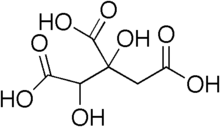Hydroxycitric acid
 | |
| Names | |
|---|---|
| IUPAC name
1,2-dihydroxypropane-1,2,3-tricarboxylic acid | |
| Other names
Hydroxycitrate | |
| Identifiers | |
| 6205-14-7 | |
| ChemSpider | 110439 |
| Jmol interactive 3D | Image |
| PubChem | 123908 |
| |
| |
| Properties | |
| C6H8O8 | |
| Molar mass | 208.12 g·mol−1 |
| Except where otherwise noted, data are given for materials in their standard state (at 25 °C [77 °F], 100 kPa). | |
| | |
| Infobox references | |
Hydroxycitric acid (HCA) is a derivative of citric acid that is found in a variety of tropical plants including Garcinia cambogia and Hibiscus subdariffa.[1]
Biological effects
Laboratory and animal studies of HCA have produced results that indicate a potential for modulation of lipid metabolism.[2] However, a clinical study has demonstrated that HCA has no effect in terms of weight loss or reduction of fat mass.[3] A meta-analysis published in 2010 revealed that gastrointestinal adverse effects were twice as likely for users of hydroxycitric acid. The use of HCA is contra indicated in patients suffering Colitis or Inflammatory Bowel Disease. [4]
Chemical properties
One isomer of HCA, known as (2S,3R)-HCA, inhibits pancreatic alpha-amylase and intestinal alpha-glucosidase, leading to a reduction in carbohydrate metabolism in vitro.[1] In a study in Zucker rats, which are genetically predisposed to obesity, Garcinia cambogia extract containing HCA showed that high doses led to significant suppression of epididymal fat accumulation, but also had high testicular toxicity.[5] However, this study has been criticized because of possible contamination of the HCA used and various design flaws.[6][7]
References
- 1 2 Yamada T, Hida H, Yamada Y (2007). "Chemistry, physiological properties, and microbial production of hydroxycitric acid". Appl. Microbiol. Biotechnol. 75 (5): 977–82. doi:10.1007/s00253-007-0962-4. PMID 17476502.
- ↑ Shara M, Ohia SE, Yasmin T, et al. (2003). "Dose- and time-dependent effects of a novel (−)-hydroxycitric acid extract on body weight, hepatic and testicular lipid peroxidation, DNA fragmentation and histopathological data over a period of 90 days". Mol. Cell. Biochem. 254 (1–2): 339–46. doi:10.1023/A:1027358106407. PMID 14674714.
- ↑ Heymsfield SB, Allison DB, Vasselli JR, Pietrobelli A, Greenfield D, Nunez C. (1998). "Garcinia cambogia (hydroxycitric acid) as a potential antiobesity agent: a randomized controlled trial". JAMA 280 (18): 1596–600. doi:10.1001/jama.280.18.1596. PMID 9820262.
- ↑ Igho O, Shao K, Rachel P, Barbara W, Edzard E (2011). "The Use of Garcinia Extract Hydroxycitric Acid as a Weight loss Supplement: A Systematic Review and Meta-Analysis of Randomised Clinical Trials". J Obes. 2011 (622): 849. doi:10.1155/2011/509038. PMID 509038.
- ↑ Saito M, Ueno M, Ogino S, Kubo K, Nagata J, Takeuchi M (2005). "High dose of Garcinia cambogia is effective in suppressing fat accumulation in developing male Zucker obese rats, but highly toxic to the testis". Food Chem. Toxicol. 43 (3): 411–9. doi:10.1016/j.fct.2004.11.008. PMID 15680676.
- ↑ Madhusudan Soni Burdock Group (2005). "Garcinia cambogia toxicity is misleading". Food and Chemical Toxicology 43 (11): 1683–1684. doi:10.1016/j.fct.2005.05.011. PMID 15993998.
- ↑ Hayamizu, K; Tomi, H; Kaneko, I; Shen, M; Soni, MG; Yoshino, G (2008). "Effects of Garcinia cambogia extract on serum sex hormones in overweight subjects". Fitoterapia 79 (4): 255–61. doi:10.1016/j.fitote.2007.12.003. PMID 18316163.